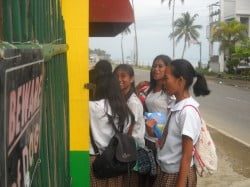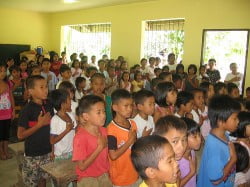[smartads]
Recently one of my readers brought up the subject of education in the Philippines and it has been getting a few responses, so I decided to chime in with a post. I wanted to express my knowledge or most likely ignorance of the education system in the Philippines. I am going to put down what my way of thinking is about the Philippines, which is not necessarily the way it is, but it is what I hear, see and perceive in my daily observations. I’m not going to look up anything online for this one, it is all coming straight from my mind, but I will skip some of the graphics generated by my mind when I get the the college level. Please feel free to criticize any of my observations, I’m educated enough to know that I do not know everything and I am also prone to mistakes. I figure I will throw in a few overtones while I am typing this up too.

To my knowledge every school here, starting in grade 1 all the way through college, have uniforms. The different types of uniforms indicate which school you attend.
Starting at the bottom. I believe they do have a pre-kindergarten here, but it seems to have optional attendance. I base that information on the fact that one of the kids here, Faye, was going to school only when she felt like it, but she usually went, and she is only 4 years old. She is a pretty bright young child though, but I do not know if it is because she is going to school or she is just one of those smart kids from birth. Both her parents and her at least her paternal grandparents are smart too, so maybe it’s generic.
I know for a fact that they have a kindergarten here. The classes are the same as I know them to be in the US. They are a 1/2 day and there are sessions in the morning and afternoon. I suppose they do that because there are so many kindergarten children here and more being made all the time. That can be hard on a parent I suppose if they have one child in the morning session and another in the afternoon. Maybe the school will keep the kids of a family together though, I’m not sure on that. Since we have been retired here we have had 3 or 4 of these children attend and graduate kindergarten.
The elementary segment of the school system here consists of grade 1 through grade 6. These are mandatory classes for all school aged children and all the ones here do attend. I know English is taught in elementary school and it seems to be effective for the most part, at least for the children here. From my dealings with other children during my walks, I would say that a some of the phrases that they learn in school are, “What is your name?” “How are you?” and “Where are you from?”. I get asked those 3 questions more than any other from the children.


They do not have what would be classified as a “middle school” , grades 7 & 8, here in the Philippines. Grades 7 through 12 are considered high school. Until recently they only had grades 7 through 10, but thanks to a new law widely known as K+12, I believe that starting this year they now have 12 grades. In my opinion, this was needed to help compete with the education systems of some of the other countries. My concern is that they may not of had enough time or input to acquire a proper curriculum for the students. I hope I am wrong on that. I would like to see a curriculum before and after the K+12 went into effect. I personally probably would have acquired the curriculum from local colleges and used the first 2 years of theirs to make my 11th and 12th grade curriculum.

The college system here seems good to me, but could definitely do with some improvement. I think that since they now have grades 11 and 12 in high school, the college system is the ones that really need to step it up. Here when you take an examination at the end of a semester, you have to pay to take the test. If you don’t pay you can not take the test and if you do not take the test, you will not graduate.
My biggest concern is that when/if students finally do graduate from college, and there are many of them, they can not find an adequate job. I know of quite a few college graduates that are driving tricycles, pedi-cabs and even pajak-pajaks. That is why the #1 export of the Philippines is the OFW (Overseas Filipino Workers). There are just not any decent jobs for them here. I am sure there are plenty of them that would prefer to stay, work and help out their own country from within. I hope that since the Philippine government has implemented the K+12, the will now turn their attention to jobs, within the Philippines for the graduates.
Overall, I think the Philippine education system is adequate. There are things I ask high school and college students about and they have no idea, but that could be a cultural thing or maybe it’s just something that they never learned in school. All learning is not done in schools. The thing that needs the most work is the jobs after graduation, but that is another story.
________________________
Just FYI: By coincidence the body of this story came out to 911 words. I guess I really think they need some help.
Also if you like this blog and think it’s worthy, please vote for me at: http://www.expatsblog.com/blogs/1188/texan-in-the-philippines




I think you pretty much nailed it John. From what I’ve seen elementary school is more than adequate. Secondary school is a bit inconsistent depending on funding or lack thereof. The biggest colleges are comparable to those anywhere but financially beyond the reach of many people here. The bad joke is that there are more Phds driving taxis than any place in the world. In the case of my Filipino relatives I see them supporting the smarter kids more than the average or less than average kids. I think they believe those kids have the most opportunity to help the family. The not so bright ones will be tomorrows fishermen, laborers and housewives. The brighter ones have the chance to follow their dreams. Sad but true.
Actually from my understanding there are only 3, maybe 4 colleges here in the Philippines that are considered good enough that they could get a job in a 1st world country without further education. I don’t know first hand, but that is what I read and hear. I suppose if the poor people had too many children, they would have to pick and choose which ones would have a better chance of getting a good job to help support them. That is if they could afford to send any at all. Yeah, you’re right, it’s a ‘bad joke’ about the PHD taxi drivers. I wish the government would take note and start fixing the problem.